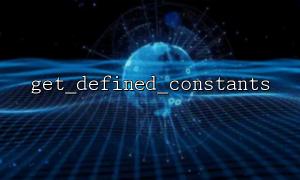In PHP, get_defined_constants() is a very useful function that returns an associative array containing all defined constants. This function is usually used to get all constants defined during the current script execution. You may encounter a problem like this: when using get_defined_constants() , class constants do not appear in the return result. So, why is this happening? In this article, we will explore this issue in depth.
First, we need to understand the concept of class constants. In PHP, class constants are constants associated with classes, not object instances. Class constants are defined by the const keyword and can be accessed inside and outside the class, but their scope is limited to that class and its inherited class. An example of definition of a class constant is as follows:
class MyClass {
const MY_CONSTANT = 'This is a class constant';
}
echo MyClass::MY_CONSTANT; // Output:This is a class constant
The difference between class constants and general quantities is that general quantities are global, while class constants are limited to the scope of classes and their inheritance.
The get_defined_constants() function returns all defined constants in the current PHP script, including predefined constants and the constants you define in the script. You can use it like this:
$constants = get_defined_constants();
print_r($constants);
This outputs an associative array containing all constant names and values.
Although get_defined_constants() can list most constants, it does not return class constants. This is because PHP's constant system treats class constants as part of a class, not global constants. Therefore, get_defined_constants() returns only global constants by default, and does not return constants related to a specific class or object instance.
If you need to get class constants, you need to access them in other ways, such as through the ReflectionClass class. Here is an example of getting class constants:
$reflectionClass = new ReflectionClass('MyClass');
$classConstants = $reflectionClass->getConstants();
print_r($classConstants);
This method will return all constants of the MyClass class, and you can access them like you would normally access them.
While this may seem like a limitation of PHP, in fact, this design conforms to the principles of object-oriented programming (OOP). In OOP, class constants belong to a specific class, not part of the global scope. Their scope is usually limited and belongs to the definition of the class, not part of the global environment. Therefore, excluding class constants from the return result of get_defined_constants() is to avoid polluting the global namespace and keeping the scope of constants clear.
If you need to access all constants, including class constants, you can do this by:
Use ReflectionClass to get class constants:
$reflectionClass = new ReflectionClass('MyClass');
$classConstants = $reflectionClass->getConstants();
print_r($classConstants);
Manually collect class constants:
You can manually collect class constants separately from global constants, store class constants inside the class, or manage them centrally in other ways.
Extend get_defined_constants() :
You can create a custom function that combines get_defined_constants() and ReflectionClass to return all constants, including class constants.
function get_all_constants() {
$constants = get_defined_constants();
$classes = get_declared_classes();
foreach ($classes as $class) {
$reflectionClass = new ReflectionClass($class);
$constants = array_merge($constants, $reflectionClass->getConstants());
}
return $constants;
}
$allConstants = get_all_constants();
print_r($allConstants);
This method returns global constants as well as class constants.
PHP's get_defined_constants() function does not return class constants because class constants belong to the definition scope of the class, not global constants. To access class constants, you can get them through ReflectionClass , or customize methods to list class constants with global constants. The purpose of this is to keep the scope of constants clear and follow the principles of object-oriented programming.














